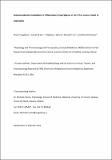| dc.contributor.author | Fitzgibbon, Marie | |
| dc.contributor.author | Kerr, Daniel M. | |
| dc.contributor.author | Henry, Rebecca J. | |
| dc.contributor.author | Finn, David P. | |
| dc.contributor.author | Roche, Michelle | |
| dc.date.accessioned | 2020-01-10T08:30:54Z | |
| dc.date.issued | 2019-09-07 | |
| dc.identifier.citation | Fitzgibbon, Marie, Kerr, Daniel M., Henry, Rebecca J., Finn, David P., & Roche, Michelle. (2019). Endocannabinoid modulation of inflammatory hyperalgesia in the IFN-α mouse model of depression. Brain, Behavior, and Immunity, 82, 372-381. doi: https://doi.org/10.1016/j.bbi.2019.09.006 | en_IE |
| dc.identifier.issn | 1090-2139 | |
| dc.identifier.uri | http://hdl.handle.net/10379/15687 | |
| dc.description.abstract | Depression is a well-recognised effect of long-term treatment with interferon-alpha (IFN-alpha), a widely used treatment for chronic viral hepatitis and malignancy. In addition to the emotional disturbances, high incidences of painful symptoms such as headache and joint pain have also been reported following IFN-alpha treatment. The endocannabinoid system plays an important role in emotional and nociceptive processing, however it is unknown whether repeated IFN-alpha administration induces alterations in this system. The present study investigated nociceptive responding in the IFN-alpha-induced mouse model of depression and associated changes in the endocannabinoid system. Furthermore, the effects of modulating peripheral endocannabinoid tone on inflammatory pain-related behaviour in the IFN-alpha model was examined. Repeated IFN-alpha administration (8000 IU/g/day) to male C57/B16 mice increased immobility in the forced swim test and reduced sucrose preference, without altering body weight gain or locomotor activity, confirming development of the depressive-like phenotype. There was no effect of repeated IFN-alpha administration on latency to respond in the hot plate test on day 4 or 7 of treatment, however. formalin-evoked nociceptive behaviour was significantly increased in IFN-alpha treated mice following 8 days of IFN-alpha administration. 2-Arachidonoyl glycerol (2-AG) levels in the periaqueductal grey (PAG) and rostroventromedial medulla (RVM), and anandamide (AEA) levels in the RVM, were significantly increased in IFN-alpha-, but not saline-, treated mice following formalin administration. There was no change in endocannabinoid levels in the prefrontal cortex, spinal cord or paw tissue between saline- or IFN alpha-treated mice in the presence or absence of formalin. Furthermore, repeated IFN-alpha and/or formalin administration did not alter mRNA expression of genes encoding the endocannabinoid catabolic enzymes (fatty acid amide hydrolase or monoacylglycerol lipase) or endocannabinoid receptor targets (CB1, CB2 or PPARs) in the brain, spinal cord or paw tissue. Intra plantar administration of PF3845 (1 mu g/10 mu l) or MJN110 (1 mu g/10 mu l), inhibitors of AEA and 2-AG catabolism respectively, attenuated formalin-evoked hyperalgesia in IFN-alpha, but not saline-, treated mice. In summary, increasing peripheral endocannabinoid tone attenuates inflammatory hyperalgesia induced following repeated IFN-alpha administration. These data provide support for the endocannabinoid system in mediating and modulating heightened pain responding associated with IFN alpha-induced depression. | en_IE |
| dc.description.sponsorship | Funding from Molecular Medicine Ireland Clinical & Translational Research Scholars Programme and Science Foundation Ireland Research Frontiers Project (Grant no. 11/RFP/NES/3175) is gratefully acknowledged. The authors would also like to thank Prof Benjamin Cravatt for the gift of the compounds PF3845 and MJN110 used in this study. | en_IE |
| dc.format | application/pdf | en_IE |
| dc.language.iso | en | en_IE |
| dc.publisher | Elsevier | en_IE |
| dc.relation.ispartof | Brain Behavior And Immunity | en |
| dc.rights | Attribution-NonCommercial-NoDerivs 3.0 Ireland | |
| dc.rights.uri | https://creativecommons.org/licenses/by-nc-nd/3.0/ie/ | |
| dc.subject | Inflammation-induced depression | en_IE |
| dc.subject | Forced swim test | en_IE |
| dc.subject | Anhedonia | en_IE |
| dc.subject | Formalin test | en_IE |
| dc.subject | Anandamide | en_IE |
| dc.subject | 2-AG | en_IE |
| dc.subject | FAAH | en_IE |
| dc.subject | MAGL | en_IE |
| dc.subject | CB1 receptor | en_IE |
| dc.subject | CHRONIC HEPATITIS-C | en_IE |
| dc.subject | ANXIETY-LIKE BEHAVIORS | en_IE |
| dc.subject | INTERFERON-ALPHA | en_IE |
| dc.subject | PHARMACOLOGICAL INHIBITION | en_IE |
| dc.subject | OPIOID RECEPTOR | en_IE |
| dc.subject | FORMALIN TEST | en_IE |
| dc.subject | PAIN | en_IE |
| dc.subject | EXPRESSION | en_IE |
| dc.subject | SYSTEM | en_IE |
| dc.subject | MECHANISMS | en_IE |
| dc.title | Endocannabinoid modulation of inflammatory hyperalgesia in the IFN-α mouse model of depression | en_IE |
| dc.type | Article | en_IE |
| dc.date.updated | 2020-01-09T15:17:42Z | |
| dc.identifier.doi | 10.1016/j.bbi.2019.09.006 | |
| dc.local.publishedsource | https://doi.org/10.1016/j.bbi.2019.09.006 | en_IE |
| dc.description.peer-reviewed | peer-reviewed | |
| dc.contributor.funder | Clinical and Translational Research Scholars Programme, Molecular Medicine Ireland | en_IE |
| dc.contributor.funder | Science Foundation Ireland | en_IE |
| dc.description.embargo | 2020-09-07 | |
| dc.internal.rssid | 18382086 | |
| dc.local.contact | Michelle Roche, Physiology, Rm2002 Human Biology Building, National University Of Ireland G, University Road. 5427 Email: michelle.roche@nuigalway.ie | |
| dc.local.copyrightchecked | Yes | |
| dc.local.version | ACCEPTED | |
| dcterms.project | info:eu-repo/grantAgreement/SFI/SFI Research Frontiers Programme (RFP)/11/RFP.1/NES/3175/IE/Endocannabinoid regulation of neuroinflammatory responses following bacterial and viral infection/ | en_IE |
| nui.item.downloads | 363 | |


